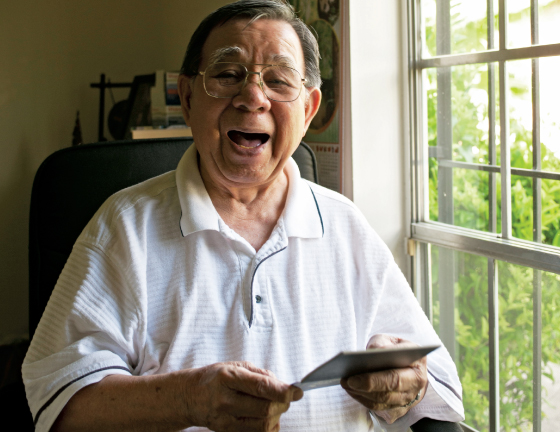Paul Kattapong knows the secrets to a long life: First, have oily skin. It makes your
face look younger. Second, wash your hands constantly to keep germs away. And
finally, laugh often.
 At 93 years old, he's hanging his hopes on these three things
to get him to 100. "I will try my best to live to 100 years old," he said. "Once I get
there, I will join the centennial crowd. After that, I will try my best to get to the
super-centennial. I keep my fingers crossed."
At 93 years old, he's hanging his hopes on these three things
to get him to 100. "I will try my best to live to 100 years old," he said. "Once I get
there, I will join the centennial crowd. After that, I will try my best to get to the
super-centennial. I keep my fingers crossed."

It's looking good. Despite arthritis, gout and swollen legs that require him to use a walker, Kattapong boasts that his doctors estimate he'll make it to 109. "I hope that is true."
Even now, Kattapong is UTSA's oldest living alum. And 31 years after receiving his master's degree in the College of Education and Human Development's bicultural-bilingual studies program, where he concentrated on English as a second language, he still remembers how difficult—but worthwhile—it was to complete his degree.
"Those four years were really tough," he said. "I came home after 5 p.m., sat down in my chair and I would catnap for 5 to 10 minutes before I would get up and go to my evening class. I finally finished my 36-hour requirement, but it was very rough those four years."
But nothing in Kattapong's life has come easy. Kattapong was born in 1917 in Bangkok, Thailand, to Chinese parents. When he was 6 years old, he began attending school, first learning Chinese, then Thai, before studying English.
When he was in seventh grade, his father died, and so did Kattapong's guaranteed education. Unlike the U.S., where all students can attend public schools for free, Thailand required students to pay tuition. Without his father's income to pay for school, Kattapong was faced with a choice: quit school or work for it.
He began cleaning classrooms to pay for his education.
"From seventh grade until I left Bangkok, I had no single money from my parents," he said. "I had to earn it for myself."
He finished high school and then attended college at Chulalongkorn University in Bangkok. During World War II, he became a member of an underground movement fighting alongside American forces.
After the war, he said, he received a scholarship from the Hazen Foundation to attend George Williams College in Chicago, where he majored in group work education.
In 1954, he met and married his wife, Verna Anna Voth.
After graduating from college, Kattapong got a job with the Department of Defense in Monterey, Calif., teaching Thai. Over the next 32 years, he continued working with the government, rising in rank from language instructor to specialist to supervisor, and was stationed in such countries as Japan and Germany.
Kattapong credits his mother, Maasii, for the route his life has taken. Though she never went to school or learned to read or write, she pushed for Kattapong to finish school at whatever cost. It's a message he's passed down to his children and grandchildren.
"One day my mother was sick…and she told me to study hard, complete your education and graduation and stand tall in your community, raise your father's family flag up in the sky. I never forgot about that," he said.
Kattapong beams as he pulls out a family portrait, unframed and browned with time. Pointing to it, he said his son, Paul Kattapong Jr., received his M.B.A. from UTSA. His daughter, Jane, earned her M.D. from the University of Texas Medical Branch at Galveston. And his other daughter, Kristi, earned her Ph.D. in applied social psychology from Loyola University Chicago.
He pulls out a black notebook, where he keeps information about his eight grandchildren. The oldest, he said, wants to go to Harvard.
"Education helped me a lot," he said. "If I had never heard my mother's words to remind me and encourage me to pursue an education, I would never have had the chance to come to the U.S. I would never have had the chance to finish my college education and all of my children to get through their education. And I'm working with my third generation now."
And, if what his doctors say is true, he'll live long enough to see that generation walk the stage. He's got his fingers crossed.
—Lety Laurel